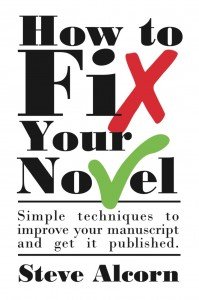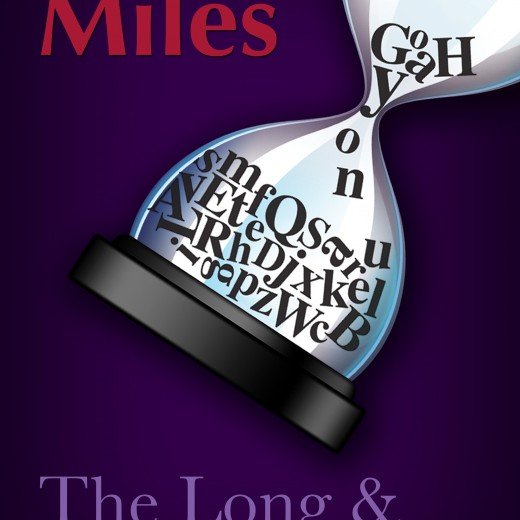Ten Simple Tricks to Perk Up Your Writing by Steve Alcorn

Welcome to guest columnist, Steve Alcorn. Enjoy his ten simple tricks to perk up your writing.
***
The ultimate measure of you as an author is the competence with which you write. There are a few simple things you can do to perk up your writing. If you get into the habit of following these techniques, you’ll be amazed at the difference they make. Best of all, most of them are specific enough that you can even use your word processor’s search command to find problems in your finished work and fix them.
1. Be Active, Not Passive
Avoid the passive verb combinations that start with was, is, are, and were, as well as passive tenses that use the word had. They make your writing boring.
Here’s a very passive sentence from Everlost by Neil Shusterman:
There was a point of light at the end of the tunnel, getting larger and brighter as she got closer, and there came a feeling in her heart of calm amazement she could not describe.
What makes it passive? “There was,” “getting larger,” “got closer,” “there came,” and “could not” are all lifeless ways to describe the action. How could we reword this to be more active and interesting? How about this:
A point of light at the end of the tunnel swelled, growing larger and brighter as she drew close. A feeling of calm amazement engulfed her.
Notice that I also deleted some excess baggage. Feelings are always attributed to the heart, and “calm amazement” seems to pretty accurately describe it, so why say she couldn’t describe it?
Converting passive verbs to active ones is probably the single best way to perk up your novel.
***
2. Adjectives are Tools, Not Decorations
Adjective are words that modify nouns. They add color (sometimes literally!) to your writing, but it’s easy to overdo them.
Jack picked up the brown bat from the walnut Formica table that sat in the dusty dugout and climbed the rickety stairs to the sun-drenched playing field.
That’s a few too many modifiers!
The best way to use adjectives is to apply them to things that you want your readers to picture a certain way. Otherwise, just let your readers use their imaginations.
A particularly good way to use adjectives is to stick with one metaphor. Here’s an example from Uglies by Scott Westerfeld:
The early summer sky was the color of cat vomit.
Of course, Tally thought, you’d have to feed your cat only salmon-flavored cat food for a while, to get the pinks right. The scudding clouds did look a bit fishy, rippled into scales by a high-altitude wind. As the light faded, deep blue gaps of night peered through like an upside-down ocean, bottomless and cold.
Here, all of the adjectives relate to the ocean: salmon, fishy, rippled, scales, blue, bottomless, cold.
Be sure to include all of the senses in your adjective choices.
Remember, adjectives are tools. Their purpose is to convey a specific message to your reader. They’re not decorations to be hung on every object in your novel. Use them with care.
***
3. First, Kill All the Adverbs
As useful as adjectives are, adverbs are useless. Adverbs are words that modify verbs. The problem is that there’s almost always a better verb that would eliminate the need for the adverb. Why write that someone walked leisurely when you could say they strolled? It’s just excess baggage. Most authors work diligently (er, I mean they toil) to make sure there are few, if any, adverbs in their finished novels.
That’s not to say it’s impossible to get published if you’re a chronic adverb abuser. Twilight, by Stephenie Meyer, is one of the biggest selling young adult books of all time, and it’s overflowing with them. Chapter 13 alone contains 97 adverbs!
When you find yourself tacking an adverb onto your verb, there is almost always a better verb you could use instead.
***
4. Tell Us What, Not How
When you’re in a character’s viewpoint, the words see and hear are mostly dead weight. Just show us what the character experiences. For example, don’t say:
She could hear the babble of the river and see it sparkling.
You can just say:
The river babbled and sparkled.
This same approach can often eliminate words like look, listen, feel, and so on.
***
5. You Don’t Need the Word ‘that’
At least not very much. How many that’s in this sentence are doing anything:
I know that you think that I did something that you wanted.
The answer is none.
I know you think I did something you wanted.
Search for the word that throughout your novel and see what happens if you delete it. Most of the time you’ll find (that) it wasn’t doing anything.
***
You don’t need excess verbiage. Back when people got paid by the word, it was common to write something like this:
The inexorable advance of the earthly sphere brought with it another glorious resurrection of the warming and nourishing heavenly beacon.
It was dawn, dude. Get over it.
***
7. Watch those clichés
They’re as common as dirt, but you should avoid them like the plague. They’re insidious, aren’t they? So I always do a final scan for any that have slipped in.
***
8. There’s No Such Thing As Coincidence
Sure, they happen in real life. But readers expect fiction to be more logical than real life. If something happens, make sure you’ve laid the foundation.
***
9. Don’t Dangle
It’s tempting to try to mix things up, dangling participial phrases everywhere, but it will just get you into trouble. Participles imply simultaneity:
Fetching the kettle, Amanda made tea.
Amanda must be a very talented girl, because she can make tea while she’s reaching for a kettle! This is what I really meant:
Amanda fetched the kettle and made tea.
I’ve picked a simple example, but I’ve seen this type of sentence go on for an entire paragraph. Break it up. Keep it simple. One thought per sentence. Your readers will thank you!
***
10. Use a Checklist
Whenever you finish a manuscript, go through this checklist and apply each “trick,” one at a time. They’re simple! And many are probably things you already subconsciously knew. But now that you have a list, you can be conscientious about applying them. Follow these simple tricks in every manuscript, and you’re on your way to perkier writing!
***
Check out Steve Alcorn’s incredible online video course, Novel Writing Workshop.
***
 ABOUT THE AUTHOR: Steve Alcorn is the CEO of Alcorn McBride Inc., a company that designs products used in nearly all of the world’s theme parks. He is the author of seven books, including How to Fix Your Novel. During the past decade he has taught more than 10,000 aspiring fiction writers through the online learning programs of 1500 colleges and universities worldwide. Find out how to enroll in his classes at writingacademy.com
ABOUT THE AUTHOR: Steve Alcorn is the CEO of Alcorn McBride Inc., a company that designs products used in nearly all of the world’s theme parks. He is the author of seven books, including How to Fix Your Novel. During the past decade he has taught more than 10,000 aspiring fiction writers through the online learning programs of 1500 colleges and universities worldwide. Find out how to enroll in his classes at writingacademy.com








Some great tips here! Makes me want to start writing short stories again. Thank you 🙂
I’d love to write a novel one of these days but just don’t have the patience!
Your sharp points were as crystal clear as glass. Just joking.
Thank you.
I had a teacher that made me use the word”that”. I struggle with whether or not to use it. But, I will listen to you.
I love the way you used real examples to demonstrate the use of adjectives. I got such a kick out Uglies “cat vomit ” color. The grand kids read that book, now I must read it, too.
This is valuable post for me to refer to often. thanks
Good reminders that the simplest, most straight-forward writing is often the best.